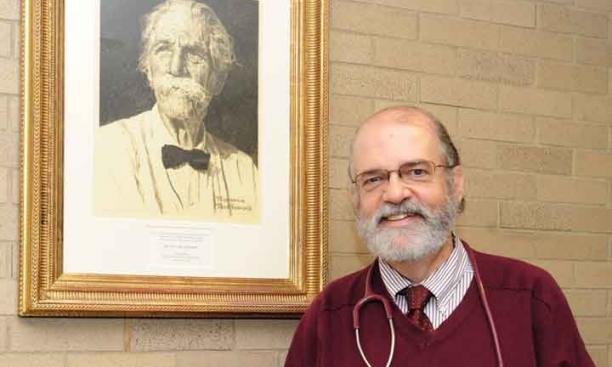This is a guest post by Lachlan Forrow, MD, ASF President and Board Chair and a 1982 Lambarene Fellow for Life. We thank him for sharing his reflections and invite others to respond with your own thoughts in the Comments below.
Last week, when Kristin Boggs invited me to offer some reflections about Dr. Schweitzer on his birthday this year, I immediately agreed. She suggested the following questions:
• What can we learn from Schweitzer’s life that is applicable today?
• How do you personally live out Schweitzer’s legacy, as a FFL and Board member? How has it shaped your past, and how does it direct your intentions for the future?
As often happens, however, I have found it much harder to answer these questions than I anticipated, even though Kristin had agreed with my sense that the main value of anything I might write would be in how it might spark other Schweitzer Fellows and Fellows for Life (FFL’s) – and perhaps others involved in our Fellows Programs – to think together about ways in which reflecting on Dr. Schweitzer’s life and ideas can help us today, both within ASF and in our lives generally.
I start below with partial very short (almost “soundbite”) answers to Kristin’s two questions, and then offer some more detailed reflections.
What I most hope for in writing this is that others will respond – with your own ideas, with questions, with perhaps most valuably any disagreements about things I have written, so we can all learn from each other, both about how we can best live our own individual lives, and about how together we can best contribute to the lives of those around us.
Warmly,
Lachlan
SHORT VERSIONS OF ANSWERS:
1. I find Schweitzer’s idea of “Reverence for all Life” (see much more detail below!) and his insistence that “My Life is My Argument” to be two of the most compelling and helpful guides as I think about my own life.
2. I also find (though I do not discuss it below) his idea of “The Fellowship of Those Who Bear the Mark of Pain” compelling (see excerpt in a Google Doc here). Since this idea inspired the name of “The Albert Schweitzer Fellowship”, I think it is worthwhile for anyone involve in ASF to reflect on it.
3. I continue to find it an ongoing challenge (sometimes even daily) not only to figure out what I things I might do are truly most important, but also how best to do them. In this, I often find that other people (friends/family) who really know me well have some better perspectives than I do myself.
4. Some of the hardest of these challenges are when time/energy for people who I care most about (especially immediate family) competes with time/energy for others whose problems/needs are by almost any criteria far more serious and urgent.
5. I used to think I would one day figure these challenges out, but I no longer believe any simple/clear answers exist, except that each of us is responsible for the choices we make, including the priorities we set for ourselves.
6. Since Albert Schweitzer is not a role model for me, or anyone I know, for how to be either married (e.g. a husband) or a parent (e.g. a father), his life is of little use to me as a guide for those central aspects of my life – except that I believe that he made his choices very thoughtfully/deliberately, and took responsibility for them.
Finally:
7. One of the most important ways in which Schweitzer is a role model for me is in his relentless questioning of everything – he did not take anything “on authority”. In his scholarly work, this included radical criticisms of almost all earlier New Testament scholarship and much of Christian ‘dogma’ (which led many to consider him a Christian “heretic”), and radically-new interpretations of the music of Johann Sebastian Bach. As he once wrote:
The highest honor one can show to a system of thought is to test it ruthlessly with a view to discovering how much truth it contains, just as steel is assayed to try its strength.
So it would be utterly incompatible with any “Schweitzer Spirit” to take any different approach to Schweitzer’s own ideas.

To read the long version of Dr. Forrow’s reflection, see HERE.
Do Dr. Forrow’s comments resonate for you? How might you answer one of those questions? We’d love to hear in the comments below.

